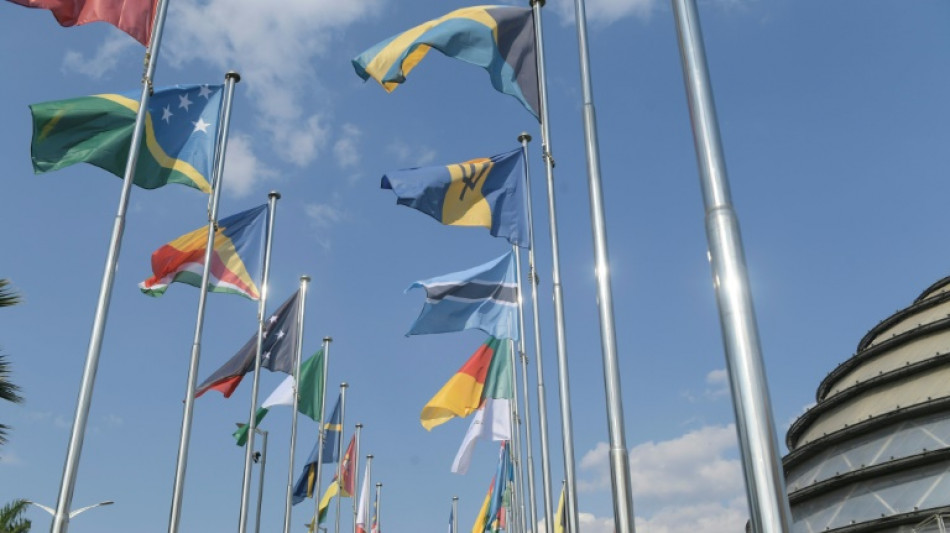

Commonwealth meets in shadow of migrant, rights row
A summit of Commonwealth leaders opens Friday in Rwanda as the host nation comes under scrutiny over its rights record and a migrant deal with Britain threatens to overshadow the meeting.
A bitter contest is also looming for the leadership of the 54-nation club of mainly former British colonies as it grapples with its changing identity and future relevance.
The Commonwealth represents one-third of humanity spanning parts of Africa, Asia, Europe and the Americas but some of its most prominent leaders are skipping the summit, sending envoys in their place.
Prince Charles, representing Queen Elizabeth II as head of the Commonwealth, made the first visit of any British royal to Rwanda for the gathering, which culminates in two days of leadership meetings.
He will meet on the sidelines on Friday with British Prime Minister Boris Johnson, who has been promoting his much-criticised deal to expel migrants to Rwanda since arriving in Kigali Thursday.
The scheme involves Britain deporting asylum-seekers thousands of miles away to Rwanda and has been fiercely opposed by the church, rights groups and -- reportedly -- Charles himself.
Johnson -- who discussed the plan with its other architect Paul Kagame at a meeting with the Rwandan president on Thursday -- said he would defend the proposal to Charles and other critics.
"What the critics of the policy need to understand, and I have seen loads and loads of criticism, is that Rwanda has undergone an absolute transformation in the last couple of decades," the British leader said.
- Rights scrutiny -
Johnson has vowed to press ahead with the deal, which has faced legal challenges in British and international courts, and loomed large ahead of the Commonwealth Heads of Government Meeting.
A first flight of asylum-seekers from the UK to Rwanda was due to take off last week but was halted following an intervention by the European Court of Human Rights.
Johnson also praised Kagame for the "leaps and bounds" achieved in Rwanda, despite widespread concerns over a lack of political freedom and civil liberties in the tiny African nation.
Rights groups have openly questioned the suitability of Rwanda hosting the Commonwealth, which has a charter that enshrines respect for democracy and human rights as core shared values.
More than 20 rights groups and civil society organisations have warned the Commonwealth risked credibility by staging the summit in Rwanda, where they said a "climate of fear" existed under long-ruling Kagame.
The Democratic Republic of Congo has also called on Britain to condemn Rwanda over its alleged "aggression" in the mineral-rich eastern Congo, where Kigali has been accused of stoking a rebellion.
- Leadership rumblings -
At least publicly these concerns have not been raised and a "ministerial action group" to scrutinise the behaviour of Commonwealth members released no statement after their meeting.
Forums ahead of the summit have addressed everything from trade and investment to malaria, climate change, and mental health.
The leaders' meetings over the next two days behind closed doors will miss some heavyweights, including Narendra Modi of India, South Africa's Cyril Ramaphosa and Australia's Anthony Albanese.
Republican movements are taking root in some Commonwealth nations and there has been renewed discussion about the future role of the royal family in the club, and its broader purpose in a post-colonial world.
At the same time, the west African states of Togo and Gabon are set to become the latest members of the Commonwealth despite having no historic ties to Britain -- like host Rwanda, which joined in 2009.
Friday will also bring to a head a tussle for the leadership of the Commonwealth that has turned ugly at times.
Kamina Johnson Smith is challenging Patricia Scotland for the post as secretary-general, despite Commonwealth convention dictating the incumbent should stand unopposed for a second term.
Smith, who is Jamaica's foreign minister, has the backing of the UK, which has publicly expressed dissatisfaction with Scotland's stewardship of the organisation.
(P.Toussaint--LPdF)




